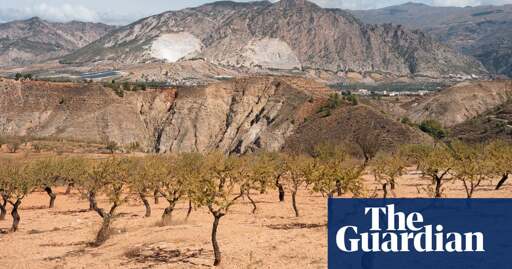But while Garriga and other Catalans have been suffering water shortages in recent years, there’s one group of people that appears to be immune, and even profits from them: the multinational companies extracting millions of litres of water from the very same land. This isn’t just a Spanish issue – across the world, from Uruguay to Mexico, Canada to the UK, many have begun to question whether private corporations should be allowed to siphon off a vital public resource, then sell it back to citizens as bottled water.
The tragedy in Spain makes the country one of the canaries in the coalmine when it comes to understanding the global threat to water security. Can the growing number of angry citizens surrounded by private water plants but left without safe water in their homes force a rethink of how this resource is managed? And as weather patterns change, should private companies continue to have easy access to vital reserves of underground water?
Maybe this’ll get people to care about Nestlé. You reap what you sow.
Why would this be the tipping point after everything else they’ve done? They’ve also done this exact thing many times across the globe. (Wanted to post an example, but there’s a LOT coming up when you google ‘nestle drought’, so I didn’t want to post just a small part)
If starting out as a family of slavers didn’t end their dynasty, then nothing will.
People don’t care until it affects them. Out of sight out of mind - until it’s in your backyard. It won’t change the shopping habits of people in Madrid or outside of Spain, but those directly or indirectly affected might finally consider checking the labels on the things they buy. Maybe, just maybe, they’ll see a Nestlé logo and go “fuck them, I’m not buy any of their products again”.
It’s exactly the same with climate change.
One of two things is going to happen when companies decide they own (all) the fresh water (and people become desperate)
Either the company hires enough goons and/or thugs to keep their “investment” safe through lethal force and scare the plebs away, possibly
employingbribing“lobbying” governments to do it for themOR
The people who are right there next to water sources they are being told to pay more than they can afford to drink from will arm themselves and overwhelm the defending forces with sheer numbers, resulting in an internationally covered bloodbath, kickstarting Water War 1 as other companies rush to beat back any perceived defiance, nations attempt to secure access to fresh water whether it’s on their land or not, and normal people prepare for the worst.
Mad Max?
More like Water Knife
Or Tank Girl
Or the government steps in and solves it. This is Europe, dummy.
I’m sorry, do you think Europe will be unaffected by global climate change?
I can imagine the delivery trucks being held up by locals wanting their water back. The trouble is, the people who work at the plant are the locals - as the article makes clear, some welcome Nestle et al because they want the jobs.
When my neighbor still drives the truck for the company that shot my son for taking an illegal sip of rain water, my neighbor is the enemy and will be judged for his complicity.
Spain being a first world country in Europe no less, might be able to litigate or legislate their way out of this without much bloodshed. It’ll be the smaller and less well off countries that we’ll unfortunately see violence erupt because the government would be in the pocket of the corporations.
Raise up your scythes, defenders of the land!
(From the Catalonian national anthem)
Oh, enough with the Catalonian myths and BS, FFS!
(I’m part Catalonian)
Doesn’t Spain has a national water distribution network?
I live right next door, we’re completely laughed at by the effing spanish (fuck off and keep the Philips for yourself!) and we have an ever expanding network of water distribution and sewage treatment.
All right, time to correct things! Surrender to the real Iberian lords and lets make this peninsula the new Atlantis!!! Without the sinking part!
Of course, but even though it’s considered perfectly safe to drink, the tap water in Catalonia and many other places in Spain is disgusting tasting if you don’t filter it and most people don’t even try, they just lug the 5l bottles every other day from the shops.
It’s a failure at many levels to be honest and nobody in power does anything about it.
No offense but I had the displeasure to taste spanish water (bottled) and it is not good at all. It’s oily, greasy. Just plain foul.
And if the distribution water is not good, then it is not being properly treated.
I agree, on both accounts. This is why I filter mine, but I am a super tiny minority. Everyone else just chugs plastic all day.
Bullshit. Spanish bottled water is spring water, not filtered water. It is not oily, period. Give us lab data, proof. All bottled water must pass testing by independent labs. Water in coastal areas is often not great tasting, but 100% safe. This is because many networks are centuries old, and can have infiltration from seawater, but it’s all 100% human safe. You’ll find a ton of areas in Belgium, Germany, and the Netherlands where tap water doesn’t taste great. Water in Madrid, and other non coastal areas, for example is so good, it’s often said it could be bottled and sold.
As for treatment, it’s properly treated, it’s not like in the US where you can get amoeba from tap water, or have flammable tap water!
If I was not clear enough, I was mentioning how it tasted to me; I was not claiming it actually had oil or grease in it, which are contaminants and should never be present in water, even less if bottled, which was the case.
by coincidence, I actually have some knowledge on the matter because I work in water distribution, and the only off taste water should carry is from excess chlorination for desinfecting repaired ruptured lines. Apart from that, all the processes used to treat water for consumption remove off tastes.
I just visited a water treatment plant this week, that captures water from an artificial lake - water in the open air, where fish and birds live, animals go to drink and human recreation occurs, etc - that after undergoing several stages and processes of treatment carries no unpleasant aftertaste.
And I lived for decades near the coastline and never having saltwater contamination in the distribution lines was a concern. And the gross majority of said water was and still is captured directly from Tejo and is often filthy coming into the treatment plant.
By contrast, I can easily find a bottled water with off taste - for my own personal liking - because said waters don’t undergo any treatment. As you said: bottled water is usually spring water, captured from underground reservoirs. But every water has an organoleptic profile from the place it is stored in nature.






